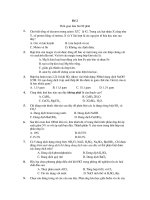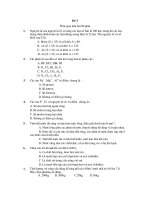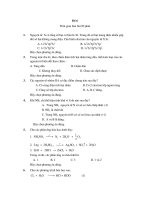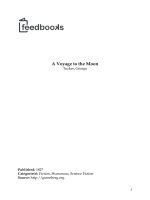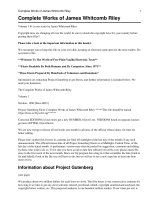A Child-World - James Whitcomb Riley pdf
Bạn đang xem bản rút gọn của tài liệu. Xem và tải ngay bản đầy đủ của tài liệu tại đây (796.28 KB, 101 trang )
A Child-World
James Whitcomb Riley
A CHILD-WORLD
The Child-World—long and long since lost to view—
A Fairy Paradise!—
How always fair it was and fresh and new—
How every affluent hour heaped heart and eyes
With treasures of surprise!
Enchantments tangible: The under-brink
Of dawns that launched the sight
Up seas of gold: The dewdrop on the pink,
With all the green earth in it and blue height
Of heavens infinite:
The liquid, dripping songs of orchard-birds—
The wee bass of the bees,—
With lucent deeps of silence afterwards;
The gay, clandestine whisperings of the breeze
And glad leaves of the trees.
* * * * *
O Child-World: After this world—just as when
I found you first sufficed
My soulmost need—if I found you again,
With all my childish dream so realised,
I should not be surprised.
CONTENTS
PROEM
THE CHILD-WORLD
THE OLD-HOME FOLKS
ALMON KEEPER
NOEY BIXLER
“A NOTED TRAVELER”
A PROSPECTIVE VISIT
AT NOEY’S HOUSE
“THAT LITTLE DOG”
THE LOEHRS AND THE HAMMONDS
THE HIRED MAN AND FLORETTY
THE EVENING COMPANY
MAYMIE’S STORY OF RED RIDING HOOD
LIMITATIONS OF GENIUS
MR. HAMMOND’S PARABLE—THE DREAMER
FLORETTY’S MUSICAL CONTRIBUTION
BUD’S FAIRY-TALE
A DELICIOUS INTERRUPTION
NOEY’S NIGHT-PIECE
COUSIN RUFUS’ STORY
BEWILDERING EMOTIONS
ALEX TELLS A BEAR-STORY
THE PATHOS OF APPLAUSE
TOLD BY “THE NOTED TRAVELER”
HEAT-LIGHTNING
UNCLE MART’S POEM
“LITTLE JACK JANITOR”
FINALE
A Child-World
1
THE CHILD-WORLD
A Child-World, yet a wondrous world no less,
To those who knew its boundless happiness.
A simple old frame house—eight rooms in all—
Set just one side the center of a small
But very hopeful Indiana town,—
The upper-story looking squarely down
Upon the main street, and the main highway
From East to West,—historic in its day,
Known as The National Road—old-timers, all
Who linger yet, will happily recall
It as the scheme and handiwork, as well
As property, of “Uncle Sam,” and tell
Of its importance, “long and long afore
Railroads wuz ever dreamp’ of!”—Furthermore,
The reminiscent first Inhabitants
Will make that old road blossom with romance
Of snowy caravans, in long parade
Of covered vehicles, of every grade
From ox-cart of most primitive design,
To Conestoga wagons, with their fine
Deep-chested six-horse teams, in heavy gear,
High names and chiming bells—to childish ear
And eye entrancing as the glittering train
Of some sun-smitten pageant of old Spain.
And, in like spirit, haply they will tell
You of the roadside forests, and the yell
Of “wolfs” and “painters,” in the long night-ride,
And “screechin’ catamounts” on every side.—
Of stagecoach-days, highwaymen, and strange crimes,
And yet unriddled mysteries of the times
Called “Good Old.” “And why ‘Good Old’?” once a rare
Old chronicler was asked, who brushed the hair
Out of his twinkling eyes and said,—“Well John,
They’re ‘good old times’ because they’re dead and gone!”
The old home site was portioned into three
Distinctive lots. The front one—natively
Facing to southward, broad and gaudy-fine
With lilac, dahlia, rose, and flowering vine—
A Child-World
2
The dwelling stood in; and behind that, and
Upon the alley north and south, left hand,
The old wood-house,—half, trimly stacked with wood,
And half, a work-shop, where a workbench stood
Steadfastly through all seasons.—Over it,
Along the wall, hung compass, brace-and-bit,
And square, and drawing-knife, and smoothing-plane—
And little jack-plane, too—the children’s vain
Possession by pretense—in fancy they
Manipulating it in endless play,
Turning out countless curls and loops of bright,
Fine satin shavings—Rapture infinite!
Shelved quilting-frames; the toolchest; the old box
Of refuse nails and screws; a rough gun-stock’s
Outline in “curly maple”; and a pair
Of clamps and old krout-cutter hanging there.
Some “patterns,” in thin wood, of shield and scroll,
Hung higher, with a neat “cane-fishing-pole”
And careful tackle—all securely out
Of reach of children, rummaging about.
Beside the wood-house, with broad branches free
Yet close above the roof, an apple-tree
Known as “The Prince’s Harvest”—Magic phrase!
That was a boy’s own tree, in many ways!—
Its girth and height meet both for the caress
Of his bare legs and his ambitiousness:
And then its apples, humoring his whim,
Seemed just to fairly hurry ripe for him—
Even in June, impetuous as he,
They dropped to meet him, halfway up the tree.
And O their bruised sweet faces where they fell!—
And ho! the lips that feigned to “kiss them well”!
“The Old Sweet-Apple-Tree,” a stalwart, stood
In fairly sympathetic neighborhood
Of this wild princeling with his early gold
To toss about so lavishly nor hold
In bounteous hoard to overbrim at once
All Nature’s lap when came the Autumn months.
Under the spacious shade of this the eyes
Of swinging children saw swift-changing skies
Of blue and green, with sunshine shot between,
A Child-World
3
And “when the old cat died” they saw but green.
And, then, there was a cherry-tree.—We all
And severally will yet recall
From our lost youth, in gentlest memory,
The blessed fact—There was a cherry-tree.
There was a cherry-tree. Its bloomy snows
Cool even now the fevered sight that knows
No more its airy visions of pure joy—
As when you were a boy.
There was a cherry-tree. The Bluejay set
His blue against its white—O blue as jet
He seemed there then!—But now—Whoever knew
He was so pale a blue!
There was a cherry-tree—Our child-eyes saw
The miracle:—Its pure white snows did thaw
Into a crimson fruitage, far too sweet
But for a boy to eat.
There was a cherry-tree, give thanks and joy!—
There was a bloom of snow—There was a boy—
There was a Bluejay of the realest blue—
And fruit for both of you.
Then the old garden, with the apple-trees
Grouped ‘round the margin, and “a stand of bees”
By the “white-winter-pearmain”; and a row
Of currant-bushes; and a quince or so.
The old grape-arbor in the center, by
The pathway to the stable, with the sty
Behind it, and upon it, cootering flocks
Of pigeons, and the cutest “martin-box”!—
Made like a sure-enough house—with roof, and doors
And windows in it, and veranda-floors
And balusters all ‘round it—yes, and at
Each end a chimney—painted red at that
And penciled white, to look like little bricks;
And, to cap all the builder’s cunning tricks,
Two tiny little lightning-rods were run
Straight up their sides, and twinkled in the sun.
Who built it? Nay, no answer but a smile.—
A Child-World
4
It may be you can guess who, afterwhile.
Home in his stall, “Old Sorrel” munched his hay
And oats and corn, and switched the flies away,
In a repose of patience good to see,
And earnest of the gentlest pedigree.
With half pathetic eye sometimes he gazed
Upon the gambols of a colt that grazed
Around the edges of the lot outside,
And kicked at nothing suddenly, and tried
To act grown-up and graceful and high-bred,
But dropped, k’whop! and scraped the buggy-shed,
Leaving a tuft of woolly, foxy hair
Under the sharp-end of a gate-hinge there.
Then, all ignobly scrambling to his feet
And whinneying a whinney like a bleat,
He would pursue himself around the lot
And—do the whole thing over, like as not!
Ah! what a life of constant fear and dread
And flop and squawk and flight the chickens led!
Above the fences, either side, were seen
The neighbor-houses, set in plots of green
Dooryards and greener gardens, tree and wall
Alike whitewashed, and order in it all:
The scythe hooked in the tree-fork; and the spade
And hoe and rake and shovel all, when laid
Aside, were in their places, ready for
The hand of either the possessor or
Of any neighbor, welcome to the loan
Of any tool he might not chance to own.
A Child-World
5
THE OLD-HOME FOLKS
Such was the Child-World of the long-ago—
The little world these children used to know:—
Johnty, the oldest, and the best, perhaps,
Of the five happy little Hoosier chaps
Inhabiting this wee world all their own.—
Johnty, the leader, with his native tone
Of grave command—a general on parade
Whose each punctilious order was obeyed
By his proud followers.
But Johnty yet—
After all serious duties—could forget
The gravity of life to the extent,
At times, of kindling much astonishment
About him: With a quick, observant eye,
And mind and memory, he could supply
The tamest incident with liveliest mirth;
And at the most unlooked-for times on earth
Was wont to break into some travesty
On those around him—feats of mimicry
Of this one’s trick of gesture—that one’s walk—
Or this one’s laugh—or that one’s funny talk,—
The way “the watermelon-man” would try
His humor on town-folks that wouldn’t buy;—
How he drove into town at morning—then
At dusk (alas!) how he drove out again.
Though these divertisements of Johnty’s were
Hailed with a hearty glee and relish, there
Appeared a sense, on his part, of regret—
A spirit of remorse that would not let
Him rest for days thereafter.—Such times he,
As some boy said, “jist got too overly
Blame good fer common boys like us, you know,
To ‘sociate with—less’n we ‘ud go
And jine his church!”
Next after Johnty came
His little tow-head brother, Bud by name.—
And O how white his hair was—and how thick
A Child-World
6
His face with freckles,—and his ears, how quick
And curious and intrusive!—And how pale
The blue of his big eyes;—and how a tale
Of Giants, Trolls or Fairies, bulged them still
Bigger and bigger!—and when “Jack” would kill
The old “Four-headed Giant,” Bud’s big eyes
Were swollen truly into giant-size.
And Bud was apt in make-believes—would hear
His Grandma talk or read, with such an ear
And memory of both subject and big words,
That he would take the book up afterwards
And feign to “read aloud,” with such success
As caused his truthful elders real distress.
But he must have big words—they seemed to give
Extremer range to the superlative—
That was his passion. “My Gran’ma,” he said,
One evening, after listening as she read
Some heavy old historical review—
With copious explanations thereunto
Drawn out by his inquiring turn of mind,—
“My Gran’ma she’s read all books—ever’ kind
They is, ‘at tells all ‘bout the land an’ sea
An’ Nations of the Earth!—An’ she is the
Historicul-est woman ever wuz!”
(Forgive the verse’s chuckling as it does
In its erratic current.—Oftentimes
The little willowy waterbrook of rhymes
Must falter in its music, listening to
The children laughing as they used to do.)
Who shall sing a simple ditty all about the Willow,
Dainty-fine and delicate as any bending spray
That dandles high the happy bird that flutters there to trill a
Tremulously tender song of greeting to the May.
Ah, my lovely Willow!—Let the Waters lilt your graces,—
They alone with limpid kisses lave your leaves above,
Flashing back your sylvan beauty, and in shady places
Peering up with glimmering pebbles, like the eyes of love.
Next, Maymie, with her hazy cloud of hair,
And the blue skies of eyes beneath it there.
Her dignified and “little lady” airs
A Child-World
7
Of never either romping up the stairs
Or falling down them; thoughtful everyway
Of others first—The kind of child at play
That “gave up,” for the rest, the ripest pear
Or peach or apple in the garden there
Beneath the trees where swooped the airy swing—
She pushing it, too glad for anything!
Or, in the character of hostess, she
Would entertain her friends delightfully
In her play-house,—with strips of carpet laid
Along the garden-fence within the shade
Of the old apple-trees—where from next yard
Came the two dearest friends in her regard,
The little Crawford girls, Ella and Lu—
As shy and lovely as the lilies grew
In their idyllic home,—yet sometimes they
Admitted Bud and Alex to their play,
Who did their heavier work and helped them fix
To have a “Festibul”—and brought the bricks
And built the “stove,” with a real fire and all,
And stovepipe-joint for chimney, looming tall
And wonderfully smoky—even to
Their childish aspirations, as it blew
And swooped and swirled about them till their sight
Was feverish even as their high delight.
Then Alex, with his freckles, and his freaks
Of temper, and the peach-bloom of his cheeks,
And “amber-colored hair”—his mother said
‘Twas that, when others laughed and called it “red”
And Alex threw things at them—till they’d call
A truce, agreeing ”’t’uz n’t red ut-tall!”
But Alex was affectionate beyond
The average child, and was extremely fond
Of the paternal relatives of his
Of whom he once made estimate like this:—
“I’m only got two brothers,—but my Pa
He’s got most brothers’n you ever saw!—
He’s got seben brothers!—Yes, an’ they’re all my
Seben Uncles!—Uncle John, an’ Jim,—an’ I’
Got Uncle George, an’ Uncle Andy, too,
An’ Uncle Frank, an’ Uncle Joe.—An’ you
Know Uncle Mart.—An’, all but him, they’re great
A Child-World
8
Big mens!—An’ nen s Aunt Sarah—she makes eight!—
I’m got eight uncles!—‘cept Aunt Sarah can’t
Be ist my uncle ‘cause she’s ist my aunt!”
Then, next to Alex—and the last indeed
Of these five little ones of whom you read—
Was baby Lizzie, with her velvet lisp,—
As though her Elfin lips had caught some wisp
Of floss between them as they strove with speech,
Which ever seemed just in yet out of reach—
Though what her lips missed, her dark eyes could say
With looks that made her meaning clear as day.
And, knowing now the children, you must know
The father and the mother they loved so:—
The father was a swarthy man, black-eyed,
Black-haired, and high of forehead; and, beside
The slender little mother, seemed in truth
A very king of men—since, from his youth,
To his hale manhood now—(worthy as then,—
A lawyer and a leading citizen
Of the proud little town and county-seat—
His hopes his neighbors’, and their fealty sweet)—
He had known outdoor labor—rain and shine—
Bleak Winter, and bland Summer—foul and fine.
So Nature had ennobled him and set
Her symbol on him like a coronet:
His lifted brow, and frank, reliant face.—
Superior of stature as of grace,
Even the children by the spell were wrought
Up to heroics of their simple thought,
And saw him, trim of build, and lithe and straight
And tall, almost, as at the pasture-gate
The towering ironweed the scythe had spared
For their sakes, when The Hired Man declared
It would grow on till it became a tree,
With cocoanuts and monkeys in—maybe!
Yet, though the children, in their pride and awe
And admiration of the father, saw
A being so exalted—even more
Like adoration was the love they bore
The gentle mother.—Her mild, plaintive face
A Child-World
9
Was purely fair, and haloed with a grace
And sweetness luminous when joy made glad
Her features with a smile; or saintly sad
As twilight, fell the sympathetic gloom
Of any childish grief, or as a room
Were darkened suddenly, the curtain drawn
Across the window and the sunshine gone.
Her brow, below her fair hair’s glimmering strands,
Seemed meetest resting-place for blessing hands
Or holiest touches of soft finger-tips
And little roseleaf-cheeks and dewy lips.
Though heavy household tasks were pitiless,
No little waist or coat or checkered dress
But knew her needle’s deftness; and no skill
Matched hers in shaping pleat or flounce or frill;
Or fashioning, in complicate design,
All rich embroideries of leaf and vine,
With tiniest twining tendril,—bud and bloom
And fruit, so like, one’s fancy caught perfume
And dainty touch and taste of them, to see
Their semblance wrought in such rare verity.
Shrined in her sanctity of home and love,
And love’s fond service and reward thereof,
Restore her thus, O blessed Memory!—
Throned in her rocking-chair, and on her knee
Her sewing—her workbasket on the floor
Beside her,—Springtime through the open door
Balmily stealing in and all about
The room; the bees’ dim hum, and the far shout
And laughter of the children at their play,
And neighbor-children from across the way
Calling in gleeful challenge—save alone
One boy whose voice sends back no answering tone—
The boy, prone on the floor, above a book
Of pictures, with a rapt, ecstatic look—
Even as the mother’s, by the selfsame spell,
Is lifted, with a light ineffable—
As though her senses caught no mortal cry,
But heard, instead, some poem going by.
The Child-heart is so strange a little thing—
A Child-World
10
So mild—so timorously shy and small.—
When grown-up hearts throb, it goes scampering
Behind the wall, nor dares peer out at all!—
It is the veriest mouse
That hides in any house—
So wild a little thing is any Child-heart!
Child-heart!—mild heart!—
Ho, my little wild heart!—
Come up here to me out o’ the dark,
Or let me come to you!
So lorn at times the Child-heart needs must be.
With never one maturer heart for friend
And comrade, whose tear-ripened sympathy
And love might lend it comfort to the end,—
Whose yearnings, aches and stings.
Over poor little things
Were pitiful as ever any Child-heart.
Child-heart!—mild heart!—
Ho, my little wild heart!—
Come up here to me out o’ the dark,
Or let me come to you!
Times, too, the little Child-heart must be glad—
Being so young, nor knowing, as we know.
The fact from fantasy, the good from bad,
The joy from woe, the—all that hurts us so!
What wonder then that thus
It hides away from us?—
So weak a little thing is any Child-heart!
Child-heart!—mild heart!—
Ho, my little wild heart!—
Come up here to me out o’ the dark,
Or let me come to you!
Nay, little Child-heart, you have never need
To fear us,—we are weaker far than you—
Tis we who should be fearful—we indeed
Should hide us, too, as darkly as you do,—
Safe, as yourself, withdrawn,
A Child-World
11
Hearing the World roar on
Too willful, woful, awful for the Child-heart!
Child-heart!—mild heart!—
Ho, my little wild heart!—
Come up here to me out o’ the dark,
Or let me come to you!
The clock chats on confidingly; a rose
Taps at the window, as the sunlight throws
A brilliant, jostling checkerwork of shine
And shadow, like a Persian-loom design,
Across the homemade carpet—fades,—and then
The dear old colors are themselves again.
Sounds drop in visiting from everywhere—
The bluebird’s and the robin’s trill are there,
Their sweet liquidity diluted some
By dewy orchard spaces they have come:
Sounds of the town, too, and the great highway—
The Mover-wagons’ rumble, and the neigh
Of overtraveled horses, and the bleat
Of sheep and low of cattle through the street—
A Nation’s thoroughfare of hopes and fears,
First blazed by the heroic pioneers
Who gave up old-home idols and set face
Toward the unbroken West, to found a race
And tame a wilderness now mightier than
All peoples and all tracts American.
Blent with all outer sounds, the sounds within:—
In mild remoteness falls the household din
Of porch and kitchen: the dull jar and thump
Of churning; and the “glung-glung” of the pump,
With sudden pad and skurry of bare feet
Of little outlaws, in from field or street:
The clang of kettle,—rasp of damper-ring
And bang of cookstove-door—and everything
That jingles in a busy kitchen lifts
Its individual wrangling voice and drifts
In sweetest tinny, coppery, pewtery tone
Of music hungry ear has ever known
In wildest famished yearning and conceit
Of youth, to just cut loose and eat and eat!—
The zest of hunger still incited on
A Child-World
12
To childish desperation by long-drawn
Breaths of hot, steaming, wholesome things that stew
And blubber, and up-tilt the pot-lids, too,
Filling the sense with zestful rumors of
The dear old-fashioned dinners children love:
Redolent savorings of home-cured meats,
Potatoes, beans, and cabbage; turnips, beets
And parsnips—rarest composite entire
That ever pushed a mortal child’s desire
To madness by new-grated fresh, keen, sharp
Horseradish—tang that sets the lips awarp
And watery, anticipating all
The cloyed sweets of the glorious festival.—
Still add the cinnamony, spicy scents
Of clove, nutmeg, and myriad condiments
In like-alluring whiffs that prophesy
Of sweltering pudding, cake, and custard pie—
The swooning-sweet aroma haunting all
The house—upstairs and down—porch, parlor, hall
And sitting-room—invading even where
The Hired Man sniffs it in the orchard-air,
And pauses in his pruning of the trees
To note the sun minutely and to—sneeze.
Then Cousin Rufus comes—the children hear
His hale voice in the old hall, ringing clear
As any bell. Always he came with song
Upon his lips and all the happy throng
Of echoes following him, even as the crowd
Of his admiring little kinsmen—proud
To have a cousin grown—and yet as young
Of soul and cheery as the songs he sung.
He was a student of the law—intent
Soundly to win success, with all it meant;
And so he studied—even as he played,—
With all his heart: And so it was he made
His gallant fight for fortune—through all stress
Of battle bearing him with cheeriness
And wholesome valor.
And the children had
Another relative who kept them glad
A Child-World
13
And joyous by his very merry ways—
As blithe and sunny as the summer days,—
Their father’s youngest brother—Uncle Mart.
The old “Arabian Nights” he knew by heart—
“Baron Munchausen,” too; and likewise “The
Swiss Family Robinson.”—And when these three
Gave out, as he rehearsed them, he could go
Straight on in the same line—a steady flow
Of arabesque invention that his good
Old mother never clearly understood.
He was to be a printer—wanted, though,
To be an actor.—But the world was “show”
Enough for him,—theatric, airy, gay,—
Each day to him was jolly as a play.
And some poetic symptoms, too, in sooth,
Were certain.—And, from his apprentice youth,
He joyed in verse-quotations—which he took
Out of the old “Type Foundry Specimen Book.”
He craved and courted most the favor of
The children.—They were foremost in his love;
And pleasing them, he pleased his own boy-heart
And kept it young and fresh in every part.
So was it he devised for them and wrought
To life his quaintest, most romantic thought:—
Like some lone castaway in alien seas,
He built a house up in the apple-trees,
Out in the corner of the garden, where
No man-devouring native, prowling there,
Might pounce upon them in the dead o’ night—
For lo, their little ladder, slim and light,
They drew up after them. And it was known
That Uncle Mart slipped up sometimes alone
And drew the ladder in, to lie and moon
Over some novel all the afternoon.
And one time Johnty, from the crowd below,—
Outraged to find themselves deserted so—
Threw bodily their old black cat up in
The airy fastness, with much yowl and din.
Resulting, while a wild periphery
Of cat went circling to another tree,
And, in impassioned outburst, Uncle Mart
Loomed up, and thus relieved his tragic heart:
A Child-World
14
”’Hence, long-tailed, ebon-eyed, nocturnal ranger!
What led thee hither ‘mongst the types and cases?
Didst thou not know that running midnight races
O’er standing types was fraught with imminent danger?
Did hunger lead thee—didst thou think to find
Some rich old cheese to fill thy hungry maw?
Vain hope! for none but literary jaw
Can masticate our cookery for the mind!’”
So likewise when, with lordly air and grace,
He strode to dinner, with a tragic face
With ink-spots on it from the office, he
Would aptly quote more “Specimen-poetry—”
Perchance like ”’Labor’s bread is sweet to eat,
(Ahem!) And toothsome is the toiler’s meat.'”
Ah, could you see them all, at lull of noon!—
A sort of boisterous lull, with clink of spoon
And clatter of deflecting knife, and plate
Dropped saggingly, with its all-bounteous weight,
And dragged in place voraciously; and then
Pent exclamations, and the lull again.—
The garland of glad faces ‘round the board—
Each member of the family restored
To his or her place, with an extra chair
Or two for the chance guests so often there.—
The father’s farmer-client, brought home from
The courtroom, though he “didn’t want to come
Tel he jist saw he hat to!” he’d explain,
Invariably, time and time again,
To the pleased wife and hostess, as she pressed
Another cup of coffee on the guest.—
Or there was Johnty’s special chum, perchance,
Or Bud’s, or both—each childish countenance
Lit with a higher glow of youthful glee,
To be together thus unbrokenly,—
Jim Offutt, or Eck Skinner, or George Carr—
The very nearest chums of Bud’s these are,—
So, very probably, one of the three,
At least, is there with Bud, or ought to be.
Like interchange the town-boys each had known—
His playmate’s dinner better than his own—
Yet blest that he was ever made to stay
A Child-World
15
At Almon Keefer’s, any blessed day,
For any meal! Visions of biscuits, hot
And flaky-perfect, with the golden blot
Of molten butter for the center, clear,
Through pools of clover-honey—dear-o-dear!—
With creamy milk for its divine “farewell”:
And then, if any one delectable
Might yet exceed in sweetness, O restore
The cherry-cobbler of the days of yore
Made only by Al Keefer’s mother!—Why,
The very thought of it ignites the eye
Of memory with rapture—cloys the lip
Of longing, till it seems to ooze and drip
With veriest juice and stain and overwaste
Of that most sweet delirium of taste
That ever visited the childish tongue,
Or proved, as now, the sweetest thing unsung.
A Child-World
16
ALMON KEEFER
Ah, Almon Keefer! what a boy you were,
With your back-tilted hat and careless hair,
And open, honest, fresh, fair face and eyes
With their all-varying looks of pleased surprise
And joyous interest in flower and tree,
And poising humming-bird, and maundering bee.
The fields and woods he knew; the tireless tramp
With gun and dog; and the night-fisher’s camp—
No other boy, save Bee Lineback, had won
Such brilliant mastery of rod and gun.
Even in his earliest childhood had he shown
These traits that marked him as his father’s own.
Dogs all paid Almon honor and bow-wowed
Allegiance, let him come in any crowd
Of rabbit-hunting town-boys, even though
His own dog “Sleuth” rebuked their acting so
With jealous snarls and growlings.
But the best
Of Almon’s virtues—leading all the rest—
Was his great love of books, and skill as well
In reading them aloud, and by the spell
Thereof enthralling his mute listeners, as
They grouped about him in the orchard grass,
Hinging their bare shins in the mottled shine
And shade, as they lay prone, or stretched supine
Beneath their favorite tree, with dreamy eyes
And Argo-fandes voyaging the skies.
“Tales of the Ocean” was the name of one
Old dog’s-eared book that was surpassed by none
Of all the glorious list.—Its back was gone,
But its vitality went bravely on
In such delicious tales of land and sea
As may not ever perish utterly.
Of still more dubious caste, “Jack Sheppard” drew
Full admiration; and “Dick Turpin,” too.
And, painful as the fact is to convey,
In certain lurid tales of their own day,
These boys found thieving heroes and outlaws
A Child-World
17
They hailed with equal fervor of applause:
“The League of the Miami”—why, the name
Alone was fascinating—is the same,
In memory, this venerable hour
Of moral wisdom shorn of all its power,
As it unblushingly reverts to when
The old barn was “the Cave,” and hears again
The signal blown, outside the buggy-shed—
The drowsy guard within uplifts his head,
And ”’Who goes there?’” is called, in bated breath—
The challenge answered in a hush of death,—
“Sh!—‘Barney Gray!’” And then ”’What do you seek?’”
”’Stables of The League!’” the voice comes spent and weak,
For, ha! the Law is on the “Chieftain’s” trail—
Tracked to his very lair!—Well, what avail?
The “secret entrance” opens—closes.—So
The “Robber-Captain” thus outwits his foe;
And, safe once more within his “cavern-halls,”
He shakes his clenched fist at the warped plank-walls
And mutters his defiance through the cracks
At the balked Enemy’s retreating backs
As the loud horde flees pell-mell down the lane,
And—Almon Keefer is himself again!
Excepting few, they were not books indeed
Of deep import that Almon chose to read;—
Less fact than fiction.—Much he favored those—
If not in poetry, in hectic prose—
That made our native Indian a wild,
Feathered and fine-preened hero that a child
Could recommend as just about the thing
To make a god of, or at least a king.
Aside from Almon’s own books—two or three—
His store of lore The Township Library
Supplied him weekly: All the books with “or“s—
Sub-titled—lured him—after “Indian Wars,”
And “Life of Daniel Boone,”—not to include
Some few books spiced with humor,—“Robin Hood”
And rare “Don Quixote.”—And one time he took
“Dadd’s Cattle Doctor.” How he hugged the book
And hurried homeward, with internal glee
And humorous spasms of expectancy!—
All this confession—as he promptly made
A Child-World
18
It, the day later, writhing in the shade
Of the old apple-tree with Johnty and
Bud, Noey Bixler, and The Hired Hand—
Was quite as funny as the book was not
O Wonderland of wayward Childhood! what
An easy, breezy realm of summer calm
And dreamy gleam and gloom and bloom and balm
Thou art!—The Lotus-Land the poet sung,
It is the Child-World while the heart beats young
While the heart beats young!—O the splendor of the Spring,
With all her dewy jewels on, is not so fair a thing!
The fairest, rarest morning of the blossom-time of May
Is not so sweet a season as the season of to-day
While Youth’s diviner climate folds and holds us, close caressed,
As we feel our mothers with us by the touch of face and breast;—
Our bare feet in the meadows, and our fancies up among
The airy clouds of morning—while the heart beats young.
While the heart beats young and our pulses leap and dance.
With every day a holiday and life a glad romance,—
We hear the birds with wonder, and with wonder watch their
flight—
Standing still the more enchanted, both of hearing and of sight,
When they have vanished wholly,—for, in fancy, wing-to-wing
We fly to Heaven with them; and, returning, still we sing
The praises of this lower Heaven with tireless voice and tongue,
Even as the Master sanctions—while the heart beats young.
While the heart beats young!—While the heart beats young!
O green and gold old Earth of ours, with azure overhung
And looped with rainbows!—grant us yet this grassy lap of
thine—
We would be still thy children, through the shower and the shine!
So pray we, lisping, whispering, in childish love and trust
With our beseeching hands and faces lifted from the dust
By fervor of the poem, all unwritten and unsung,
Thou givest us in answer, while the heart beats young.
A Child-World
19
NOEY BIXLER
Another hero of those youthful years
Returns, as Noey Bixler’s name appears.
And Noey—if in any special way—
Was notably good-natured.—Work or play
He entered into with selfsame delight—
A wholesome interest that made him quite
As many friends among the old as young,—
So everywhere were Noey’s praises sung.
And he was awkward, fat and overgrown,
With a round full-moon face, that fairly shone
As though to meet the simile’s demand.
And, cumbrous though he seemed, both eye and hand
Were dowered with the discernment and deft skill
Of the true artisan: He shaped at will,
In his old father’s shop, on rainy days,
Little toy-wagons, and curved-runner sleighs;
The trimmest bows and arrows—fashioned, too.
Of “seasoned timber,” such as Noey knew
How to select, prepare, and then complete,
And call his little friends in from the street.
“The very best bow,” Noey used to say,
“Haint made o’ ash ner hick’ry thataway!—
But you git mulberry—the bearin’-tree,
Now mind ye! and you fetch the piece to me,
And lem me git it seasoned; then, i gum!
I’ll make a bow ‘at you kin brag on some!
Er—ef you can’t git mulberry,—you bring
Me a’ old locus’ hitch-post, and i jing!
I’ll make a bow o’ that ‘at common bows
Won’t dast to pick on ner turn up their nose!”
And Noey knew the woods, and all the trees,
And thickets, plants and myriad mysteries
Of swamp and bottom-land. And he knew where
The ground-hog hid, and why located there.—
He knew all animals that burrowed, swam,
Or lived in tree-tops: And, by race and dam,
He knew the choicest, safest deeps wherein
Fish-traps might flourish nor provoke the sin
Of theft in some chance peeking, prying sneak,

